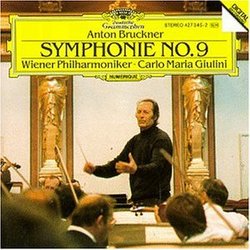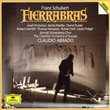| All Artists: Anton Bruckner, Carlo Maria Giulini, Vienna Philharmonic Orchestra Title: Bruckner: Symphonie No. 9 Members Wishing: 0 Total Copies: 0 Label: Deutsche Grammophon Original Release Date: 1/1/1989 Re-Release Date: 5/2/1989 Album Type: Import Genre: Classical Style: Symphonies Number of Discs: 1 SwapaCD Credits: 1 UPC: 028942734524 |
Search - Anton Bruckner, Carlo Maria Giulini, Vienna Philharmonic Orchestra :: Bruckner: Symphonie No. 9
 | Anton Bruckner, Carlo Maria Giulini, Vienna Philharmonic Orchestra Bruckner: Symphonie No. 9 Genre: Classical
It's a Shame that Conductor Carlo Maria Giulini Turned to Bruckner Relatively Late in Life If this Stunning Performance of the Ninth Symphony with the Vienna Philharmonic is Indicative of his Affinity for the Composer. Thi... more » |
Larger Image |
CD DetailsSynopsis
Album Details It's a Shame that Conductor Carlo Maria Giulini Turned to Bruckner Relatively Late in Life If this Stunning Performance of the Ninth Symphony with the Vienna Philharmonic is Indicative of his Affinity for the Composer. This is a Remarkably Noble, Spiritually Alluring Performance with Giulini Favoring Often Extremely Broad Tempos and a Wide Dynamic Range. Rarely Has the Finale of the First Movement Been So Stark and Devastating Or the Scherzo Rendered with Such Mesmerizing Clarity of Vision. Although this is a Live Recording, Deutsche Grammophon's Astonishing Audiophile Sound Fully Compliments this Outstanding Symphonic Triumph. Just Brilliant! Similar CDs
|
CD ReviewsBruckner's Ninth, Vienna, Guilini: Alchemy, Mystical Dan Fee | Berkeley, CA USA | 12/23/2004 (5 out of 5 stars) "The alchemists of the Middle Ages and before supposedly sought for the ultimate, essential nature of all known things. Their ideas were both mystical physicalizations of this or that religious theory, foreshadowing real chemistry and physics which have returned to close the circle as it were, reaching ever more symbolic understandings of subatomic reality and macrocosmic scale. All of this strange background comes to mind when you listen to this performance of the unfinished Bruckner Ninth Symphony on offer here. Carlo Maria Guilini has a deserved reputation as a conductor's conductor. He started out as a violist, playing in the prewar Augusteo orchestra, only to be later captured and interned in a camp for the war's remainder. Despite the harsh conditions, he devoted himself to studying music. By the time musical institutions in Europe were reconvened after World War II, Giulini was already gifted and deep, catching Arturo Toscanini's attention in an Italian radio broadcast of a Haydn opera, of all things. In this very big symphony, Giulini reveals that he is still a master of the deliberate tempo that still breathes and moves, alive and elegant in its almost unwavering stillness. In other hands with less heart, these slow tempos would be deadly and labored. In Giulini's hands, slow does not mean plodding. Inspired, the Vienna Philharmonic lifts up on very great wings of sound, reminding me of that famous phrase about finding men who measure up to mountains. No department of the orchestra is slipshod or slick in this recording. The recording quality is very, very high for a regular 16-bit red book CD. Given the high reach of this performance, it is only natural to wish we had it in high resolution sound, with multichannel depth and breadth. But even in stereo this CD does the red book medium proud. The inner workings of the orchestra, those mysterious changes of register which remind some listeners of organ registrations shifting and reverberating in great cathedralesque distances, are completely and transparently revealed. When the full orchestra plays, you will hear weight and light, far beyond the regular abstractness of these dimensions of presence. It's all too much, really. Only the inattentive could play this recording as background music. It achieves transformations which seem like the aural equivalents of Medieval alchemy, despite our notions that music is made up of themes and motives, key relationships, phrasing, and other such mundane elements. Everything seems made of fiery, whether wispy and ethereal, or massive and spiking out like furious sunspots burning against the walls. The only equal of these heights, but still a different performance, in my view, is Gunter Wand's Berlin Philharmonic version. If you lean towards the intense and the mystical, no holds barred, then this CD must be our first choice in this symphony. The Wand is profoundly spacious and humane, as if the Enlightenment Era were being embodied in sound. Rabid Bruckner music fans will probably decide they simply must have both. So, start buying and enjoying before Giulini and/or Wand disappear from the commercial catalogues. Highly, highly recommended: FIVE STARS, five galaxies of stars." I Hate To Say "Definitive", But... Dan Fee | 08/27/2002 (5 out of 5 stars) "Visual beauty is in the eye of the beholder as much as a symphony's aural beauty is in the hand of the baton-holder. It is this highly personal and gradually diminishing art of conductorial interpretation that keeps dedicated music collectors perusing the Internet for the secret Furtwangler stash or newly uncovered Bernstein tape, so I am loathe to call a particular performance "definitive". However, if any rendition of a Bruckner symphony makes me want to sell my Bernstein, Furtwangler, Celibidache, Skrowaczewski, Horenstein, Tintner, Walter, Barenboim, Karajan, Jochum, Chailly, Wand, Schuricht, and Haitink recordings... it is Giulini's 1989 epiphany of sound called Bruckner's 9th.Let me cut to the chase. The inspiring depth of interprative achievement can be heard in something as small as the first 59-seconds of the 3rd movement: slow, but purposeful; mystical, but existential; emotional, but knowing; and eloquent, but precise. Such poetic intelligence is conjured up by Giulini and his VPO magicians in every note and every movement: music as knowledge from some other dimension. Specific molecules are excited and particular quarks tremble on the vibrations of such music: a world is opened to the attentive listner through which he/she can glimpse a meaning to Being. (Hyperbole? But isn't the quest for such exceptional life-enhancing knowledge the very reason one experiences art? As Annie Dillard said, "Why are we reading if not in hope of beauty laid bare, life heightened and its deepest mystery probed?")The icing on the cake is a recording that is dynamic in its range, crystaline in its detail and state-of-the-art in its fidelity. I cannot give higher praise than to say that I never really heard Bruckner's 9th until I had the honor of listening to Giulini and the VPO on this miracle of a recording." A glorious performance of Bruckner's great unfinished 9th Kenji Fujishima | East Brunswick, NJ USA | 07/13/2004 (5 out of 5 stars) "The fact that Bruckner never completed his Ninth Symphony never stopped any maestro and orchestra from attempting to master what is perhaps one of the composer's greastest works. The three movements that Bruckner completed are just so magnificent, and the Adagio so ethereal and satisfying at its close, that it seems spiritually complete despite its technically unfinished nature. I have not personally heard any of the sketches and attempted completions of the fourth movement; nor do I necessarily want to. This great symphonic torso stands on its own quite well, I think, and many conductors and music lovers seem to agree with that assessment as well.I will not admit to having heard a great many recordings of this piece. Eugen Jochum's EMI performance was my first exposure to the piece, and Bernard Haitink's 1965 Phillips performance my second. Both were good performances, very dramatic and quite satisfying, but I was always curious about this particular DG recording, especially having heard so many complimentary things about Carlo Maria Giulini's extremely long-breathed interpretation of the work.Well, as it turns out, the hype is richly deserved. This is a glorious performance of Bruckner's great unfinished Ninth, marvelously played by the Vienna Philharmonic (always so good in Bruckner) and conducted by Giulini with great sensitivity and grand vision. His tempos are sometimes slower-than-usual, and yet he hardly ever allows the piece to drag. More importantly, though, Giulini shapes this to be powerfully dark, brooding, but ultimately uplifting work that Bruckner's Ninth must be. The close of the first movement is grandly stark and tragic, the Scherzo (one of Bruckner's most dissonant and savage dances) almost demonic in its power, and the Adagio properly anguished and lamenting until the end, when the Vienna strings and horns lift this music up to the figurative heavens. Maybe you'll even feel lifted up as well.I have no qualms about recommending this disc to anyone who is even remotely interested in this piece. Bruckner's Ninth, though incomplete, is one of the great works of the symphonic literature, and Giulini and the Vienna Philharmonic do it full justice."
|

 Track Listings (3) - Disc #1
Track Listings (3) - Disc #1

